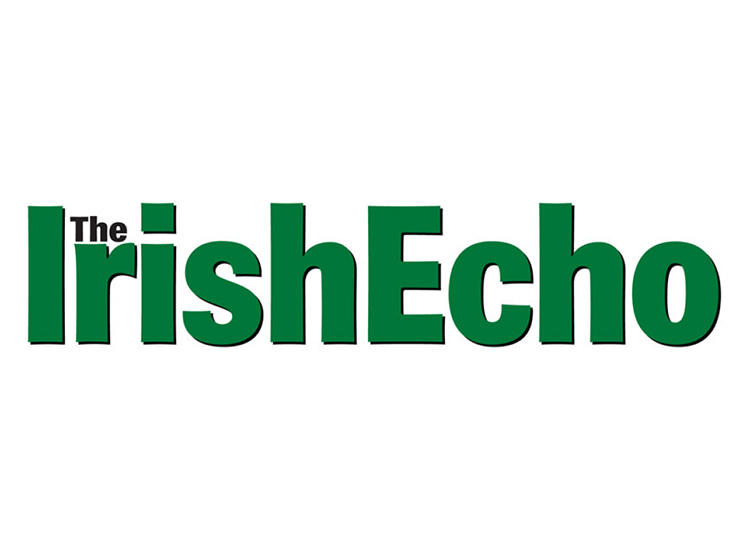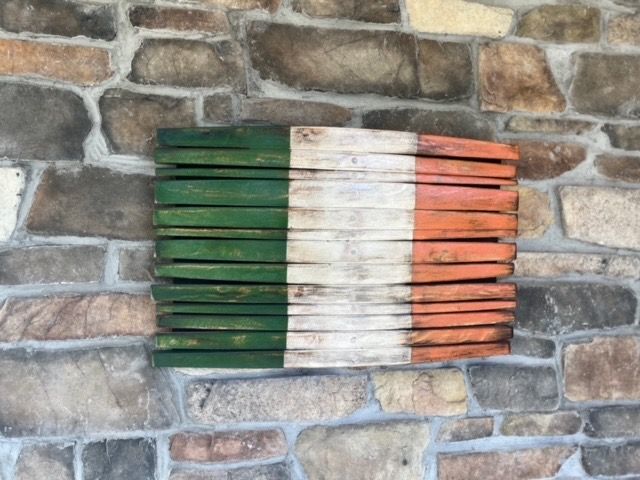Paul Finnegan, the former director of the Emerald Isle Immigration Center and the New York Irish Center, hosts the podcast CenterPieceNY.
By Peter McDermott
“Good trouble.”
That’s what Paul Finnegan favors and it help explains the arc of his career in the community over a period of more than 30 years.
He invoked the term last month in an episode of his podcast, CenterPieceNY, when County Kildare-born businessman Sean Benson, a leader of the Irish Immigration Reform Movement from the late 1980s onwards, and originator of the slogan “Legalize the Irish,” said that his niece was running as a local election candidate for the Green Party in England.
Finnegan hasn’t been involved in the whole range of activities that the late Congressman John Lewis participated in and defined as “good trouble” — who has? — but there are quite a few on his resume: from grassroots activism to volunteerism, from policy formulation and strategizing to knocking on doors at election time.
Well, specifically primary time, most recently. The Galway City-raised married father of two children has been giving a helping hand to Elizabeth Crowley’s campaign for Queens Borough President,
“I think she’s a tremendously dedicated, hard-working public servant and really cares about Queens,” Finnegan said. “She’s a leader.”
He added, though, that he believes that her rivals are also strong candidates and would do a “fine job.”
The former executive director of both the Emerald Isle Immigration Center in Woodside and the Long Island City-based New York Irish Center started out as a foot soldier with the IIRM, with Benson and some others directing operations. The campaign not only legalized tens of thousands of Irish and brought over thousands more from home, it was vital, in Benson’s view, in allowing the passage of the last pro-immigration bill in Congress, 31 years ago.
“The machinery is still there,” Finnegan said of the political process.
“It’s threatened obviously. Democracy in the late 1980s was rock solid. We’ve been reminded it’s not to be taken for granted,” he said. “You’re either vehemently on one side or the other and there’s no in between, or you just disengage completely. So it’s not good.
“I would say it has to be laid at the feet of the media. It has become such an industry, really an entertainment industry. It sucked people in and played on things other than getting them involved in building a better society, played on fears. I suppose it played on biases.
“You have to look at people like Rupert Murdoch and what role he has played in where we are today in America,” Finnegan said.
“Back in the 1980s, though, it seemed like you came to America and it was an open playing field for people to talk, to speak and to advance their own agendas,” he recalled.
Out of the IIRM activism grew practical initiatives that uplifted the Irish, such as seminars that encouraged people to build on their first-rate primary and secondary education in Ireland with college qualifications here.
Mayor Ed Koch said at the time that undocumented immigrants in New York would not be charged out-of-state fees in city-run colleges. All of this allowed many of the Irish to move up from child-care and bar/restaurant work to more secure footholds in the white-collar and professional middle-class.
If the tide has shifted considerably against immigration and immigrants in the decades since, Finnegan can point to some hopeful signs on the political scene of late.
“We’re seeing changes finally in terms of social justice and more inclusion, more diversity,” he said. “Democracy has to reflect the people.”
It’s something that he has a vested interest in. According to ancestry.com his roots are in Galway and Cork, which he already knew; while his Dominican-born wife Rosa’s are what she might have guessed: Native American, African and Spanish.
“We’re more cautious now, my wife and I, about our children’s future,” he said. “It’s sad but it’s true.
“When my children were born, it felt different. The whole country felt different. The whole world felt different. We thought the diversity in our children was to be celebrated. We didn’t think anybody else would not celebrate it,” Finnegan remembered. “Now we have to say ‘what does it mean for their safety long-term?’ When it hits home with your children, you begin to think about it a lot more. But I’m confident my kids will be fine.”
He tells his daughter who is in high school (his son is in college) to go out and made “good trouble.”
Finnegan, who recently added a certificate in non-profit management to his NUI, Galway, degree in engineering and master’s in business from Baruch College, kept hearing Lewis’s catchphrase cited by his fellow students. And he would recommend someone new from Ireland or from anywhere to become involved making good trouble at whatever level.
“It’s wonderful to attach yourself to [an electoral] campaign and give it the conviction of belief and energy of youth,” he said. Beyond that, in the tradition of the IIRM, “if you want to form a grassroots movement, it’s very exciting and it does lead to change.”
For Finnegan, nobody better represents the new optimism afoot than Rep. Alexandria Ocasio-Cortez. “Even though I thought that Joe Crowley was doing a great job,” he said. “AOC came in and she brought that newness and she’s a tremendously smart person, a gifted person on so many levels.”
Surnames indicating roots in Ireland may be rather less numerous in electoral politics than in previous times but New York is still a city that’s run by people who were mentored by Irish people in a number of sectors, in Finnegan’s view.
“I think the Irish were such an important part of the formation of what New York City is today, and so embedded in its history, that they really had a lot to do with the spirit of New York,” he said. “It’s almost as if the spirit of New York is the spirit of the Irish on so many different levels.
“I know I’m biased,” he added with a laugh.
The Irish dominance of the political clubhouse has long passed, but the community has vibrant organizations like the Emerald Isle, the NYIC, the Irish Repertory Theatre and the Irish Arts Center that depend on a mix of community support, Irish government funding and New York City backing. And the last one of the those three is reason enough to keep a close eye on the political process locally.
The city itself understands that funding for well-run community organizations is money well spent. “That’s why you want your representative to represent you,” Finnegan said. “You don’t want to be shut out of the political process. That’s why it’s important you know who you’re voting for and that you should vote.”
In his experience, available funds are allocated fairly “That’s what I love about New York City. There are so many groups, yet the divisiveness is small. At the end of the day, I feel that New Yorkers tend to work together to keep the city going in a peaceful way,” Finnegan said. “There are exceptions. There are things that need to be looked at and fixed, but for a city that’s large, when you look at it, and so complex, it’s a pretty efficient operation.”










